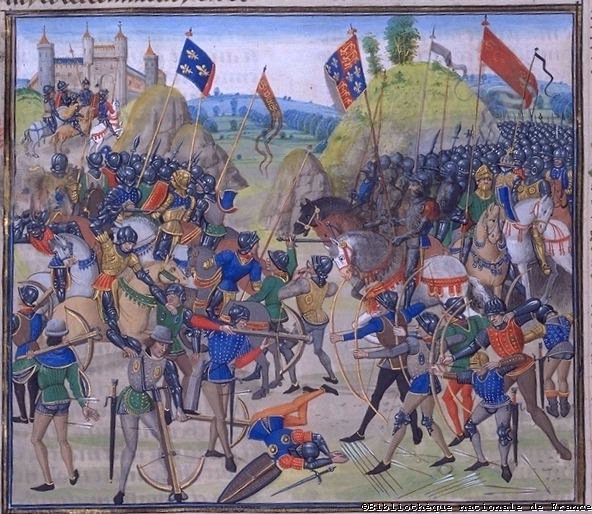August 26, 2005
Gratuitous French-Bashing

Today is the anniversary of the Battle of Crecy in 1346, in which Edward, Black Prince of Wales and his English longbowmen thrashed the French knights. (I hope you're paying attention, Steve-O.)
Shakespeare couldn't resist getting in a dig about it in his buildup to the battle of Agincourt:
Charles the Sixth:Think we King Harry strong;
And, princes, look you strongly arm to meet him.
The kindred of him hath been flesh'd upon us;
And he is bred out of that bloody strain
That haunted us in our familiar paths:
Witness our too much memorable shame
When Cressy battle fatally was struck,
And all our princes captiv'd by the hand
Of that black name, Edward, Black Prince of Wales;
Whiles that his mountain sire, on mountain standing,
Up in the air, crown'd with the golden sun,
Saw his heroical seed, and smiled to see him,
Mangle the work of nature and deface
The patterns that by God and by French fathers
Had twenty years been made. This is a stem
Of that victorious stock; and let us fear
The native mightiness and fate of him.
-Henry V, Act II, Scene 4
What is remarkable is that the battles of Crecy and Agincourt occured nearly 70 years apart, and yet the English whomped the French in almost exactly the same way each time. This says a lot about the stubborn refusal of the French Aristocracy to believe that the horse-mounted knight had been made obsolete by a longbow-weilding yeoman, a concept totally at odds with Medieval notions of chivalry.
UPDATE: Speaking of which, if you haven't read Barbara Tuchman's A Distant Mirror, you really ought to.
Posted by Robert at August 26, 2005 02:02 PM | TrackBackA recent episode of Battlefield Detectives covered the battle of Agincourt. It was interesting. They theorihat given recent advances in armor (new types of steel), the English longbows with iron-tipped arrows could not have penetrated the armor of the French Knights. TheyWOULD, however, have wreaked havoc amongst their horses. Furthermore, the terrain at Agincourt favored the English -- a plateau that fell sharply away on either side and narrowed as it approached English lines. Crowd Dynamics reasearch shows this would have caused havoc amongst the French troops. Also, once they hit the English lines, the muddy ground favored the less heavily armored English bowmen, who at that point would have drawn melee weapons like hammers and daggers.
*shrug* I've never been much on medieval history, but it sounded plausible.
Posted by: Brian B at August 26, 2005 03:00 PMGood book, yes, but outstanding post today! Thanks for the reminder!
Posted by: RP at August 26, 2005 03:37 PMHey, let's not forget that even if the French lost the battles of Crecy and Agincourt, in 1453 they did win the war.
Of course, after that they went into a bit of a slump, which so far has lasted for 552 years...
Posted by: utron at August 26, 2005 05:43 PMin 1453 they did win the war.
And even then, a FrenchMAN didn't lead them.
Posted by: Brian B at August 26, 2005 05:53 PMBesides, they'd never have won if she hadn't taken an aerobics course in San Dimas, an *ahem* AMERICAN city.
Posted by: Robbo the LB at August 26, 2005 06:02 PMAgincourt has always been overstated. Henry V had been outmaneuvered by the French while en route to his winter quarters at Calais and was somewhat outnumbered. Still, the field was to his advantage and that more than his longbowmen won the battle for him.
The field was flanked by two dense woods which forced the French into a frontal position. Furthermore the ground was muddy from recent rains so it was hard going to march in line or for cavalry to charge en mass. The French cavalry planned to ride down the English archers and this might have succeeded if the archers hadn't anchored their flanks against the woods, the ground hadn't been muddy, and the order to charge had been properly executed. As it was a disorganized mob of cavalry was met by 4 volleys of arrows which shattered their ranks and sent the survivors reeling into their own infantry, who panicked and routed before the advancing English infantry.
In point of fact there was no reason for the French cavalry to charge at all. Henry and his men were effectively boxed in with no provisions and could have been starved into surrender. They had launched an attack "for honor's sake" so that after they were repulsed they could surrender and no one would think them cowards. That it turned into an outstanding victory was as much a surprise to them as the French.
Posted by: Orion at August 26, 2005 06:51 PM





